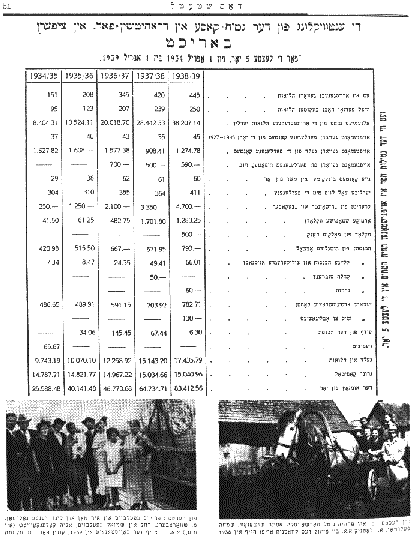 [
Page 51
]
[
Page 51
]
| 1934/35 | 1935/36 | 1936/37 | 1937/38 | 1938/39 | |
| Loans issued | 151 | 208 | 345 | 420 | 445 |
| No. recipients | 95 | 123 | 207 | 239 | 250 |
| Annual loan totals | 8,404.31 | 10,524.11 | 20,018.70 | 28,442.33 | 38,207.14 |
| Bad Accounts from 1927-35 | 37 | 40 | 43 | 35 | 45 |
| Totals from bad accounts | 1,627.28 | 1,608.00 | 1,577.38 | 908.41 | 1,274.78 |
| Bad mortgage debt | ------- | ------ | 700.00 | 500.00 | 590.00 |
| New accounts | 29 | 38 | 62 | 61 | 60 |
| Total borrowers | 304 | 310 | 355 | 364 | 411 |
| Joint and Tsekava credit | 350.00 | 1,250.00 | 2,100.00 | 3,350.00 | 4,700.00 |
| Local deposits | 41.50 | 61.25 | 482.85 | 1,701.80 | 1,283.25 |
| Member dues | 420.98 | 515.50 | 667.00 | 671.95 | 793.00 |
| Minor income and charges | 7.34 | 8.47 | 24.35 | 49.41 | 66.01 |
| Community grants | ---- | ----- | ----- | 50.00 | ----- |
| Contributions | ----- | ----- | ------ | ------ | 60.00 |
| Administration | 486.65 | 489.91 | 591.15 | 703.92 | 782.71 |
| Losses for obligations | ----- | ------ | -------- | ------ | 130.00 |
| Profit | ------ | 34.06 | 145.45 | 67.44 | 6.30 |
| Deficit | 65.67 | ----- | ------ | ---- | ------ |
| Funds in loans | 9,743.19 | 10,070.10 | 12,258.92 | 15,143.20 | 17,435.79 |
| Capital stock | 14,787.71 | 14,821.77 | 14,967.22 | 15,034.66 | 15,040.96 |
| Annual turnover | 25,588.48 | 40,141.48 | 46.773.68 | 64,734.71 | 83,412.56 |
 [
Page 52
]
[
Page 52
]
THE LAST CHAPTER
Drohitchin Jews wanted to save themselves
To summarize: the situation of
the Jews under the Polish regime was a sorry one. Soon after their arrival in
Drohitchin the Poles showed their real faces. In their treatment of the
so-called "communist
zhids
," the Poles demonstrated arrogance, malice and prejudice more than
anything else.
[Photo:] A class from the Moriah School. The teachers, from right: Palevsky,
Barantchuk, M. Bezdzhesky, Rabinovich, Wolfson, Kolnick and Hackman.
The Jews knew in advance that
their situation under the Poles wouldn't be rosy. People, especially young
people, started leaving Drohitchin for understandable reasons, and went off
into the big world. As long as it was possible, people went to America, and
later, when the United States shut its doors, young people started leaving for
Palestine. A small number of them were lucky enough too obtain certificates,
and emigrated there. Others immigrated to other countries, and several dozen
emigrated to Cuba, Argentina and Canada, until those countries also closed
their doors to Jewish immigration.
Young people who didn't leave
Drohitchin remained in town without hopes of a better tomorrow. Each year there
were increasing number of young men and women who hung around on the streets
without any purpose in life, hoping for some miracle that would allow them to
emigrate somewhere. They had no trade, since in any event there wasn't enough
work for everyone, and the town didn't need any more shopkeepers. In addition,
it became difficult for them to find mates. So the question was, "What
shall we eat?" What were they going to do the day after their wedding?
The situation was worse for
girls than it was for boys. Fathers were very concerned about their daughters'
future, and each parent hoped that a young man would arrive from the United
States and take their daughter to the golden country.
[Photo:] The Burial Society, from right: Meir Kaplan (the
Liener
), a colonist, Mordechai Perkovsky and Motya Warshavsky.
It wasn't as if Drohitchin
young people squandered their time doing nothing. They were involved in
community activities such as political parties, collecting money to send to
Palestine and pre-emigration training. Unfortunately, this activity didn't bear
any fruit; they couldn't go to Palestine because they couldn't
JewishGen, Inc. makes no representations regarding the accuracy of
the translation. The reader may wish to refer to the original material
for verification.
JewishGen is not responsible for inaccuracies or omissions in the original work and cannot rewrite or edit the text to correct inaccuracies and/or omissions.
Our mission is to produce a translation of the original work and we cannot verify the accuracy of statements or alter facts cited.
 Drogichin, Belarus
Drogichin, Belarus
 Yizkor Book Project
Yizkor Book Project
 JewishGen Home Page
JewishGen Home Page
Copyright © 1999-2025 by JewishGen, Inc.
Updated 7 Dec 2001 by LA